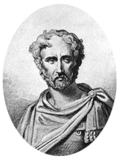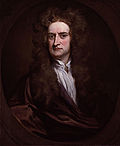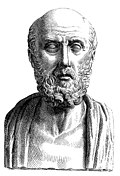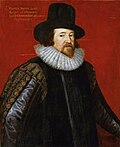Portal:History of science
The History of Science Portal
The history of science covers the development of science from ancient times to the present. It encompasses all three major branches of science: natural, social, and formal. Protoscience, early sciences, and natural philosophies such as alchemy and astrology that existed during the Bronze Age, Iron Age, classical antiquity and the Middle Ages, declined during the early modern period after the establishment of formal disciplines of science in the Age of Enlightenment.
Science's earliest roots can be traced to Ancient Egypt and Mesopotamia around 3000 to 1200 BCE. These civilizations' contributions to mathematics, astronomy, and medicine influenced later Greek natural philosophy of classical antiquity, wherein formal attempts were made to provide explanations of events in the physical world based on natural causes. After the fall of the Western Roman Empire, knowledge of Greek conceptions of the world deteriorated in Latin-speaking Western Europe during the early centuries (400 to 1000 CE) of the Middle Ages, but continued to thrive in the Greek-speaking Byzantine Empire. Aided by translations of Greek texts, the Hellenistic worldview was preserved and absorbed into the Arabic-speaking Muslim world during the Islamic Golden Age. The recovery and assimilation of Greek works and Islamic inquiries into Western Europe from the 10th to 13th century revived the learning of natural philosophy in the West. Traditions of early science were also developed in ancient India and separately in ancient China, the Chinese model having influenced Vietnam, Korea and Japan before Western exploration. Among the Pre-Columbian peoples of Mesoamerica, the Zapotec civilization established their first known traditions of astronomy and mathematics for producing calendars, followed by other civilizations such as the Maya.
Natural philosophy was transformed during the Scientific Revolution in 16th- to 17th-century Europe, as new ideas and discoveries departed from previous Greek conceptions and traditions. The New Science that emerged was more mechanistic in its worldview, more integrated with mathematics, and more reliable and open as its knowledge was based on a newly defined scientific method. More "revolutions" in subsequent centuries soon followed. The chemical revolution of the 18th century, for instance, introduced new quantitative methods and measurements for chemistry. In the 19th century, new perspectives regarding the conservation of energy, age of Earth, and evolution came into focus. And in the 20th century, new discoveries in genetics and physics laid the foundations for new sub disciplines such as molecular biology and particle physics. Moreover, industrial and military concerns as well as the increasing complexity of new research endeavors ushered in the era of "big science," particularly after World War II. (Full article...)
Selected article -
The history of artificial intelligence (AI) began in antiquity, with myths, stories, and rumors of artificial beings endowed with intelligence or consciousness by master craftsmen. The study of logic and formal reasoning from antiquity to the present led directly to the invention of the programmable digital computer in the 1940s, a machine based on abstract mathematical reasoning. This device and the ideas behind it inspired scientists to begin discussing the possibility of building an electronic brain.
The field of AI research was founded at a workshop held on the campus of Dartmouth College in 1956. Attendees of the workshop became the leaders of AI research for decades. Many of them predicted that machines as intelligent as humans would exist within a generation. The U.S. government provided millions of dollars with the hope of making this vision come true. (Full article...)
Selected image

Francis Galton was an English polymath known for his work in heredity, eugenics, and statistics. This photograph of Galton (age 73) was created upon his visit to Alphonse Bertillon's anthropometry laboratory in 1893. It serves as a good example of Bertillon's identification technology, which intended for the prosecution of criminals. Ironically, fingerprinting, a technique Galton transformed into a rigorously scientific one, eventually replaced Bertillon's system.
Did you know
...that Einstein's famous letter to FDR about the possibility of an atomic bomb was actually written by Leó Szilárd?
...that geology was transformed in the latter part of the 20th century after widespread acceptance of plate tectonics?
...that the idea of biological evolution dates to the ancient world?
Selected Biography -
Clarisse Doris Hellman Pepper (August 28, 1910 – March 28, 1973) was an American historian of science, "one of the first professional historians of science in the United States". She specialized in 16th- and 17th-century astronomy, wrote a book on the Great Comet of 1577, and was the translator of another book, a biography of Johannes Kepler. She became a professor at the Pratt Institute and later at the Queens College, City University of New York, and was recognized by membership in several selective academic societies. (Full article...)
Selected anniversaries
- 1500 – Portuguese navigator Pedro Álvares Cabral becomes the first European to sight Brazil
- 1692 – birth of James Stirling, Scottish mathematician (d. 1770)
- 1758 – death of Antoine de Jussieu, French naturalist (b. 1686)
- 1891 – birth of Harold Jeffreys, English astronomer (d. 1989)
- 1904 – birth of J. Robert Oppenheimer, American physicist (d. 1967)
- 1909 – birth of Rita Levi-Montalcini, Italian neurologist, Nobel laureate
- 1910 – birth of Norman Steenrod, American mathematician (d. 1971)
- 1919 – birth of Donald J. Cram, American chemist, Nobel laureate (d. 2001)
- 1922 – birth of Wolf V. Vishniac, American microbiologist (d. 1973)
- 1929 – birth of Michael Atiyah, mathematician
- 1945 – death of Wilhelm Cauer, German mathematician (b. 1900)
- 1951 – death of Horace Donisthorpe, British entomologist (b. 1870)
- 1980 – death of Fritz Strassmann, German physicist (b. 1902)
- 2005 – death of Philip Morrison, American physicist (b. 1915)
Related portals
Topics
General images
Subcategories
Things you can do
Help out by participating in the History of Science Wikiproject (which also coordinates the histories of medicine, technology and philosophy of science) or join the discussion.
Associated Wikimedia
The following Wikimedia Foundation sister projects provide more on this subject:
-
Commons
Free media repository -
Wikibooks
Free textbooks and manuals -
Wikidata
Free knowledge base -
Wikinews
Free-content news -
Wikiquote
Collection of quotations -
Wikisource
Free-content library -
Wikiversity
Free learning tools -
Wiktionary
Dictionary and thesaurus








































































